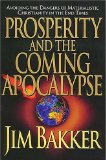Prosperity and the Coming Apocalypse: Avoiding the Dangers of Materialistic Christianity in the End Times. By Jim Bakker with Ken Abraham. Nashville: Thomas Nelson Publishers, 1998. 244 pp. Cloth, $19.99.
Yes, this is the same Jim Bakker who headed the PTL ministry and who went to jail for illegal financial practices. A Prosperity Gospel preacher himself for years, he is an ideal person to respond to this movement.
The good news is that Bakker rejects the Prosperity Gospel as another gospel. He calls Christians to follow Christ so as to please Him, not to gain material prosperity here and now.
Bakker calls the reader to base his beliefs and practices on the Word of God, not on tradition and not on one’s experiences. This is, of course, a terrific word in a very pragmatic and existential age.
The bad news is that Bakker is not clear on the gospel. He never addresses what one must do to be saved other than in passing comments. I thought he might get down to this under the heading, “The True Works Gospel” (p. 46). Unfortunately, he used the heading as a play on words and indicated “that the prosperity gospel does not work in the real world.”
In passing comments Bakker implies a number of different and even conflicting conditions for eternal salvation. On one occasion he speaks of the false gospel of Gal 1:6-9 as “salvation through legalistic works [combined] with a belief in salvation through Christ alone,” (p. 31). He clearly implies that salvation is merely through Christ alone, yet without explaining how we come to Christ. Describing how one couple gained eternal salvation he said they “committed their lives to Christ” (p. 84). He spoke of Tolstoy’s conversion, saying he came to realize that Jesus “will tolerate no other gods, no idols, before Him” (p. 86). Yet a paragraph later he said, “Of noble birth, by the time Tolstoy became a believer, he had added enormous wealth to his already bulging bank account” (italics added). This is the only place in the book I found him referring to someone as “a believer” (as opposed to a Christian, a disciple, or a follower of Christ).
In a discussion of Rev 3:16-20, Bakker indicates that lukewarm people are “people who have a form of godliness, who can keep up appearances as religious people, but who do not have a genuine relationship with Jesus Christ” (p. 207). A few sentences later he said that those who do have a genuine relationship with Him are “those who open their hearts to Him” and those who “see the life-and-death seriousness of a radical commitment to Christ.”
It thus appears that Bakker holds to a mild form of Lordship Salvation, though it is hard to tell.
Another disappointment to me was Bakker’s departure from the Pre-tribulation Rapture. When he gave up on Prosperity Theology, he also decided believers will have to suffer during the Tribulation (pp. 117-27).
Space doesn’t permit his discussion of Y2K and of comets or meteors striking the earth. There were a lot of pages devoted to topics like these that seemed to be only tangentially related to his topic, at best.
This book is encouraging in that Bakker seems to have genuinely given up on the Prosperity Gospel. Anyone wishing to know precisely what gospel he now believes, however, will have to look elsewhere.
Robert N. Wilkin
Editor
Journal of the Grace Evangelical Society
Irving, TX


